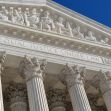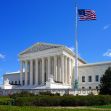On October 8, 2019, the U.S. Supreme Court will hear oral arguments on a pair of issues from three cases that have the potential to change the landscape of federal anti-discrimination law. The cases, titled Altitude Express, Inc. v Zarda, Bostock v Clayton County, Georgia and R.G. & G.R. Harris Funeral Homes Inc. v Equal Employment Opportunity Commission, concern workers who were fired based on their sexual orientation or gender identity. The cases all turn on the definition of “sex” for Title VII of the Civil Rights Act of 1964 (Title VII).
The Cases
Zarda and Bostock both address whether Title VII prohibits discrimination based on sexual orientation. In Zarda, the Second Circuit Court of Appeals held that an employee properly stated a claim for relief against his employers, a skydiving company, in alleging that they fired him in part because he was a gay man. The Eleventh Circuit came to the opposite conclusion in Bostock, upholding the dismissal of a claim against a county in Georgia alleging that they fired a child welfare services coordinator after discovering he was gay. The Supreme Court consolidated the two cases for oral argument.
Harris Funeral Homes will be argued separately. The case involves a transgender woman who was fired from her position at a funeral home after she informed her employers that she was transitioning from male to female and would begin female-presenting, including wearing clothing traditionally associated with women. The employers claimed they were following “God’s command.” The Sixth Circuit found that “discrimination against transgender persons necessarily implicates Title VII’s proscriptions against sex stereotyping” because “a transgender person is someone who fails to act and/or identify with his or her gender.” The Supreme Court will consider whether Title VII bars discrimination based on an employee’s transgender status or as sex stereotyping per Price Waterhouse v. Hopkins, discussed below.
Title VII
Title VII prohibits discrimination in the workplace based on an employee’s race, color, religion, national origin, or sex. While many states have passed more expansive anti-discrimination laws that facially prohibit discrimination based on sexual orientation or gender identity, Title VII has not been modified by Congress to include these categories explicitly. Supreme Court precedent suggests that the Title VII categories may be malleable enough to include these other forms of discrimination, however.
The Harris Funeral Homes case may turn, in particular, on the validity and scope of Price Waterhouse v. Hopkins, 490 U.S. 228 (1989). In that opinion, the Supreme Court held that discrimination on the basis of “sex” for the purposes of Title VII included discrimination based on sex or gender stereotypes. The Court held that employers could not enforce gender stereotypes in the workplace because “in forbidding employers to discriminate against individuals because of their sex, Congress intended to strike at the entire spectrum of disparate treatment of men and women resulting from sex stereotypes.”
What Will the Court Do?
Progressive legal scholars argue that sex discrimination clearly includes discrimination based on either transgender status or sexual orientation. Firing a transgender person is making a decision based on their lack of conformance to gender stereotypes, the same thing Price Waterhouse ruled unconstitutional. Decrying someone’s sexual orientation is determining who they can and cannot be romantically involved with based on their sex: A man can date or marry a woman, but a woman cannot do the same (i.e., date or marry another woman). Making an employment decision based on the employee’s sexual preference inherently turns on the sex of the employee. The arguments echo those that led to striking down interracial marriage bans in Loving v. Virginia, 388 U.S. 1 (1967).
The Supreme Court has recently shown a willingness to protect LGBT rights in landmark cases such as United States v. Windsor, 570 U.S. 744 (2013), which ruled unconstitutional the federal Defense of Marriage Act’s definition of marriage, and Obergefell v. Hodges, 135 S. Ct. 2071 (2015), which formally declared same-sex marriage bans unconstitutional. However, the last two justices appointed have cemented a strong conservative majority in the Court. Moreover, the Justice Department has chosen to weigh in against the more expansive reading of Title VII, filing amicus briefs in both sets of cases arguing that neither gay workers nor transgender workers are protected. The Court’s ultimate decision has the potential to significantly alter the course of federal anti-discrimination law for decades to come.






